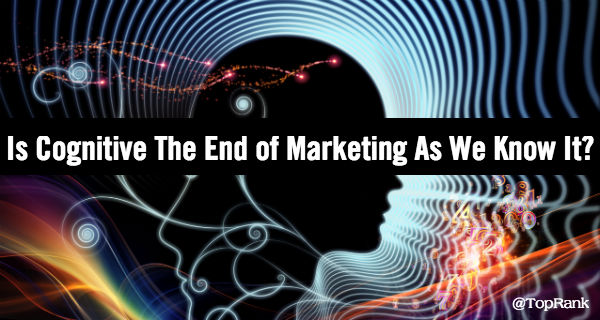
“Will artificial intelligence replace marketers in the near future?”
 This is the compelling question posted by Loren McDonald of IBM Watson Marketing during his presentation at the recent Digital Summit conference in Los Angeles. While many marketers might consider this a provocative presentation opener, there are some blunt realities marketers need to consider if they want to remain in the field and be competitive.
This is the compelling question posted by Loren McDonald of IBM Watson Marketing during his presentation at the recent Digital Summit conference in Los Angeles. While many marketers might consider this a provocative presentation opener, there are some blunt realities marketers need to consider if they want to remain in the field and be competitive.
Consider these stats:
- ‘Intelligent agents’ or AI will destroy 6% of all jobs in the US by 2021. Forrester Research
- AI could threaten up to 47% of jobs in two decades. Eric Berger, ars Technica
So what does artificial intelligence (AI) and machine learning mean, anyway?
Artificial Intelligence is about the development of computers systems that are able to perform tasks that would normally require human intelligences such as visual identification speech recognition, decision-making and translating between languages. AI performs a role in many of the stems that you use everyday from using Siri on your phone, a chatbot on an ecommerce site like Staples or 1-800-Flowers or every time you use Google.
Machine learning is a subset of AI that allows computers to learn much the same way that people do, only faster and without being explicitly programmed for every task that they can complete.
“In economics, things take longer to happen than you think they will, and then they happen faster than you thought they could.” Rudi Dornbusch, German Economist
With the oncoming ubiquity of AI in our everyday lives, you have to wonder where that trend will intersect with marketing. Loren considered whether marketers will be out of jobs in 10-15 years like Uber & Lyft drivers are expected to be. It’s a reasonable question to consider.
I was able to see a demo of IBM Watson’s Cognitive Technology for marketing at the World of Watson conference and the possibilities were impressive. Outside of considering all the ways AI and machine learning could help with extracting insight from large amounts of data and with ongoing campaign optimization, my big takeaway from the demo was that as with all industries that change, those that adapt will survive and thrive. Those that don’t, won’t.
Things like PPC, social ads and any other kind of online advertising would be ripe for AI. Another immediate and practical example of how AI and machine learning could help marketers is email subject line writing and testing. Loren suggested that you could use a tool like Phrasee, which can learn from your customer response metrics and then use machine learning to quantify and optimize language for you to use that will best engage your audience.
Thank about all the structured, repetitive and rules based tasks you might do on a regular basis as part of your job as a marketer. They are all open to being completed by an AI service. Not only could they be completed by a computer, but they could be done faster and with fewer errors. That could free marketers up to spend time on managing even more programs without additional staff.
Now, if you’re wondering what roles and tasks are at risk, Loren shared this list:
- Easily repeatable
- Data-centric
- Tasks that improve with learning
- Rules drive tasks
- Reporting
- Customer and segment analysis
- Campaign automation
- Media buying
- Campaign testing
It can certainly cause some tension to think that your job might be replaced by a computer, but Loren suggested that the solution to this impending automation of what many marketers do, is to adopt a “center brain” marketing approach.
Loren says that center-brain marketing melds right brain creativity with left brain analytical thinking with technology to fuel success in a future driven by machine learning.
Traditionally, marketing has been viewed very much as “right brain” and creative. But left brain analytical marketing has been growing fast and most marketing organizations already include a mix of both.
I know within our own agency at TopRank Marketing, we’ve been using analytics and various data types to optimize marketing programs for years. After attending IBMs WoW conference, I’ve been salivating over what one could do with bluemix access to Watson smarts for content recommendations, influencer analysis and finding many interesting correlations to help us provide better recommendations to clients. More on that in the future.
As Loren mentioned in his presentation, the shift towards cognitive will be accelerated as marketing becomes more dominated by left-brain people using machine learning and artificial intelligence for marketing decisions, targeting, creative and conversion optimization. Technologies like IBM’s Watson cognitive marketing tools will help marketers deliver more relevant content and offers at the right time than humans alone ever could.
Ultimately, Loren decided the answer to the question about whether cognitive technology will be the end of marketers and marketing as we know it should be answered in terms of what’s happening with driverless cars and the notion of level 2-4 autonomy.
Level 0 – Human only
Level 1 – Cruise control
Level 2 – Tesla Autopilot
Level 3 – The car makes decisions
Level 4 – Human as back-up
Level 5 – No human involved
You can see that there will be degrees of AI implementation, but it’s not an all or none situation. There will still be human powered marketing assisted with technology along with partially and fully automated marketing programs based on goals.
As pressures to scale competitive marketing programs increases alongside growing competition, it is inevitable that cognitive will become a normal part of marketing. The question is, what are your plans as an organization and as an individual to acquire the knowledge, skills and perspective to stay ahead of the game?
Do you think artificial intelligence and cognitive technology will replace part or all of your job? What are you doing to adapt?
You can connect with Loren McDonald on Twitter: @LorenMcDonald and LinkedIn.
This is the second of two posts from the Digital Summit Los Angeles conference that I’m posting this week. Be sure to take a look at the first one featuring Serena Ehrlich from Business Wire where I summarized her advice on search and social media promotion of news release content.

Loren McDonald, Serena Ehrlich, Lee Odden


